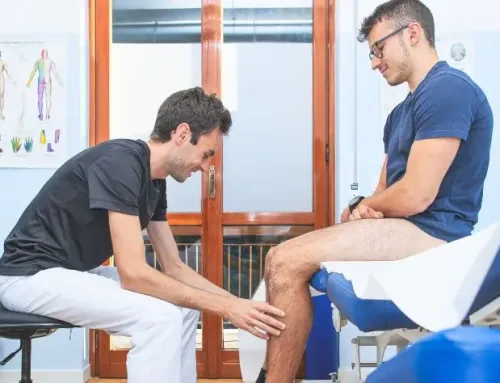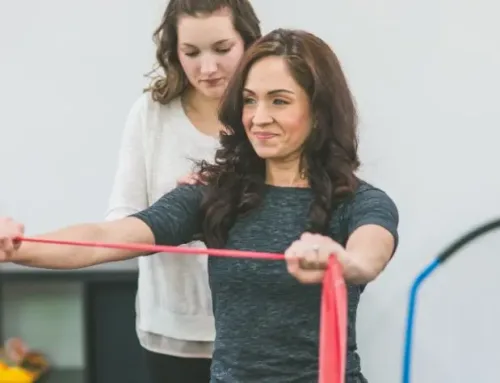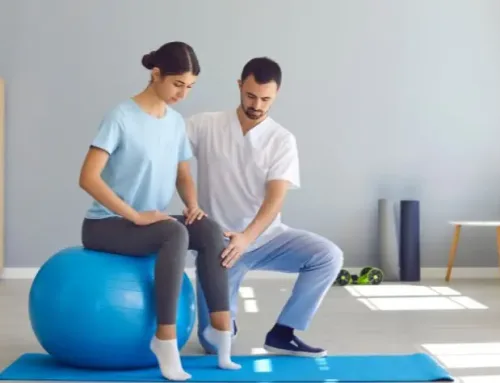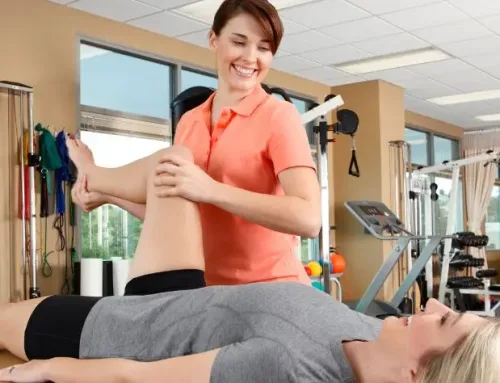Best Hybrid Online Physical Therapy Programs: Accredited & Flexible

Online physical therapy programs offer a flexible, forward-thinking path for those ready to step into a growing and impactful healthcare field. As the need for Physical Therapists increases—fueled by an aging population, chronic health conditions, and a stronger emphasis on preventative care—many students are looking for ways to earn their degree without putting their lives on hold.
Today’s top hybrid programs make it possible to gain a high-quality education through a combination of online coursework and hands-on clinical training. The right program can accelerate your timeline, expand your opportunities, and support you every step of the way. But finding that right fit takes more than a quick search—it takes knowing what to look for.
What Exactly Is a Hybrid DPT Program?
Online physical therapy programs combine the convenience of online learning with the critical hands-on training needed to become a licensed Physical Therapist. They’re designed for real life—without cutting corners on quality, rigor, or clinical readiness.
What Is a Hybrid DPT Program?
A hybrid Doctor of Physical Therapy (DPT) program blends online coursework with essential in-person training. Students complete foundational sciences, lectures, and theory through a digital platform—often self-paced or live virtual sessions—and then attend scheduled, hands-on clinical labs and immersive residencies. These in-person sessions are key to building real-world skills in areas like anatomy, diagnostics, and manual therapy.
At SCU, for example, our students come to campus six times in the first year for immersive 710 day lab experiences. In the second year, they complete clinical rotations in healthcare settings near their own communities (when available), gaining direct patient care experience without relocating.
Clearing Up Common Myths
Let’s be clear—hybrid does not mean easier, or less serious. The academic standards, licensure requirements, and clinical training in hybrid programs match those of traditional, in-person programs. Every accredited program, whether hybrid or not, must meet strict criteria set by CAPTE (Commission on Accreditation in Physical Therapy Education). This ensures graduates are fully prepared for the licensure exam and real-world practice.
You’ll still be learning anatomy. You’ll still be working with patients. And yes, you’ll still need to pass the same board exam.
Who Benefits Most from a Hybrid DPT Format?
Hybrid programs are designed with flexibility in mind. They’re ideal for students who have family or geographic commitments that make traditional, on-campus education harder to pursue.
These programs are especially well-suited for:
- Parents or caregivers who need a more adaptable schedule
- Career changers who are returning to school after time away
- Students living far from campus who can’t easily relocate for a full-time, in-person program
If you’re self-motivated, organized, and ready to commit, hybrid could be your perfect fit.
Choosing a Hybrid DPT Program? Look for These 5 Essentials
1. Program Length
Most traditional DPT programs take around three years to complete. A great hybrid program streamlines that without cutting corners. At SCU, our Doctor of Physical Therapy program is full-time and designed to be completed in just two years. That’s a full year faster than many other institutions—which means less time in school, lower overall costs, and a quicker start to your career.
2. In-Person Labs That Build Real Skills
Hybrid doesn’t mean all-online. A strong program will require you to attend scheduled, in-person labs to develop the hands-on skills critical for clinical care. These labs may happen a few times per term, often in short, intensive blocks lasting about a week. The best programs give you time to plan for these visits and structure them to make the most of each in-person experience—focusing on anatomy, manual therapy, movement analysis, and more.
3. Clinical Rotations That Reflect the Real World
The strength and diversity of a program’s clinical partnerships matters a lot. You want exposure to a wide range of patient populations and settings. Look for rotations in
- Sports medicine and orthopedic clinics
- Pediatric practices and schools
- Integrative and functional medicine environments
- Veterans’ hospitals
- Federally Qualified Health Centers and other community clinics
Another important factor: local placement. Not every student can relocate for clinicals, so programs that help you find options near your home give you flexibility and stability.
4. Learning Technology That Supports You
Online physical therapy programs go beyond PDFs and video lectures. They invest in tools that bring the content to life and support deeper, more interactive learning. Some of the best technologies to look for include:
- Synthetic cadaver models for practicing dissection and palpation skills
- Animated learning modules for complex systems like neuroanatomy
- Diagnostic imaging training to build early confidence in reading X-rays, MRIs, and CT scans
5. Financial Transparency
Tuition should be transparent—no fine print, no surprise fees. Look for programs that clearly state their costs, offer a fixed tuition guarantee, and break down financial aid options. The length of the program also plays a role: finishing in two years instead of three can significantly lower your total cost of attendance, including living expenses and lost income.
Accreditation Isn’t Optional—It’s Essential
Accreditation is what makes your degree count. If you’re serious about becoming a licensed Physical Therapist, you need to understand which accreditations matter, and which ones don’t.
Types of Accreditation: What They Mean
There are two main types of accreditation to understand—regional accreditation and programmatic accreditation.
Regional Accreditation:
This refers to the institution itself. At SCU, we’re regionally accredited by the WASC Senior College and University Commission (WSCUC), which ensures our university meets high standards in areas like faculty qualifications, curriculum, and student support. This type of accreditation is important for overall academic credibility and access to federal financial aid.
Programmatic Accreditation (CAPTE):
This is where it really counts for PT students. CAPTE—the Commission on Accreditation in Physical Therapy Education—is the only agency recognized by the U.S. Department of Education to accredit entry-level DPT programs. If your program doesn’t have CAPTE accreditation or candidacy status, you can’t sit for the licensure exam.
Licensure Starts With Accreditation
Here’s the non-negotiable truth: without graduating from a CAPTE-accredited (or candidate) program, you are not eligible to take the National Physical Therapy Examination (NPTE)—which means you can’t become a licensed PT.
To verify a program’s status:
- Visit the CAPTE Directory
- Check licensure details on the Federation of State Boards of Physical Therapy (FSBPT)
These resources are your best bet for confirming if a school will truly support your career goals.
SCU’s Hybrid DPT Program: Designed for Today, Ready for Tomorrow
At Southern California University of Health Sciences (SCU), our hybrid Doctor of Physical Therapy program is a bold, hands-on, and future-focused experience that prepares you for real-world impact in just two years.
A Smarter, Faster Timeline—Without Cutting Corners
Most DPT programs take about three years. Ours takes two—and we didn’t trim the essentials to make that happen. We reimagined the format to be more efficient, without sacrificing the academic rigor, clinical training, or personal growth required to become a standout Physical Therapist. It’s full-time, focused, and designed to keep your momentum going.
You’ll come to our campus six times during your first year for immersive lab intensives, each lasting 710 days. These sessions are packed, purposeful, and built to give you the hands-on skills you need—while still making room for your real life in between.
We Teach Both Sides of the Healthcare Equation
Our curriculum blends conventional physical therapy science with integrative and functional health principles. You’ll learn evidence-based modalities alongside complementary approaches—because real healing often takes more than one method. We train you to think across systems, collaborate across disciplines, and treat the whole person, not just the injury.
Clinical Rotations That Reflect Real Practice
Through a nationwide network of 500+ clinical partners, our students complete hands-on training in settings like:
- Sports medicine clinics
- Pediatric practices
- Veterans’ hospitals
- Functional and integrative health centers
We work with you to coordinate placements near your home (when available), so you can get diverse clinical exposure without major disruption.
Labs That Take Learning to the Next Level & Online Learning That’s Actually Engaging
Monotone online lectures are not what we do here. Our online coursework is interactive, discussion-driven, and thoughtfully designed to keep you connected to faculty and classmates. You won’t be passively watching—you’ll be actively learning.
And when it comes to anatomy, it’s always best understood through direct experience. That’s why our students participate in real cadaver labs, offering unparalleled insight into human structure and function. We also provide access to cutting-edge tools like SynDavers, Complete Anatomy 3D modeling, and DITKI, all designed to deepen understanding and enhance exam readiness. These resources are integral to how we prepare future clinicians.
Tuition You Can Plan Around
We offer a fixed tuition guarantee, so you know exactly what your investment will be. No surprises. We also provide access to federal aid (for those who qualify) and institutional scholarships to support your investment in a meaningful career.
Our Accreditation Candidacy—What It Means for You
SCU has submitted its Application for Candidacy to the Commission on Accreditation in Physical Therapy Education (CAPTE), which is the required first step toward full accreditation. Programs with candidacy status are typically eligible for licensure, and we expect our charter class to meet that eligibility upon graduation.
For up-to-date information, we encourage all prospective students to visit:
We’re proud of our progress and committed to upholding the highest standards in physical therapy education.
Join the Next Generation of Physical Therapists at SCU
Online physical therapy programs vary widely—but few offer the academic rigor, immersive training, and flexibility you’ll find in SCU’s hybrid Doctor of Physical Therapy program. From our two-year completion timeline to real cadaver labs, advanced learning tools, and local clinical placements, we’ve created an experience that meets the demands of modern healthcare and the realities of students’ lives.
If you’re serious about becoming a licensed Physical Therapist—and want a program that blends innovation, integrity, and whole-person care—SCU may be the fit you’ve been looking for. Explore our admission requirements and take the first step toward your future. Apply today.
FAQs
How long does it take to complete most online physical therapy programs?
Most take around three years. However, some accelerated hybrid options—like ours—can be completed in just two, without sacrificing clinical or academic depth.
Can I do my clinical rotations near my home?
Yes—many hybrid programs help arrange clinical placements locally, making it easier to gain experience without relocating.
How much hands-on experience will I actually get in a hybrid DPT program?
Plenty. Most programs include in-person lab immersions and full-time clinical rotations. You’ll spend hundreds of hours working directly with patients under licensed supervision.
How often would I need to travel to campus?
In our program, students come to campus six times during the first year for focused 710 day lab sessions. These are spaced out to maximize efficiency and minimize disruption.
What types of clinical settings can I expect at SCU?
We partner with over 500 sites nationwide, including sports medicine clinics, VA hospitals, pediatric centers, integrative practices, and community-based clinics.
Related Posts




